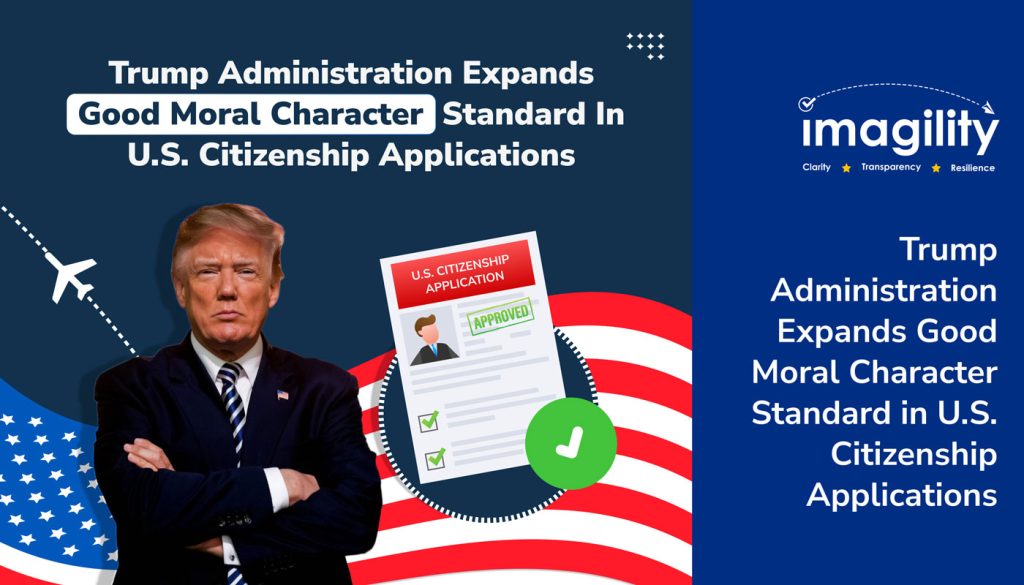On August 15, the Trump Administration announced a policy change that redefines how U.S. Citizenship and Immigration Services (USCIS) evaluates “good moral character” in naturalization applications. The update goes beyond traditional checks on conduct, expanding the review to include potential “anti-American” views as part of the assessment.
The policy directs USCIS officers to take a more holistic approach, considering not just the absence of misconduct but also positive qualities such as community involvement and responsibility.
At the same time, the screening will extend to areas such as anti-American activity, antisemitic ideologies, and even social media behavior for both citizenship and visa applicants.
USCIS chief spokesperson Matthew Tragesser said in a statement: “America’s benefits should not be given to those who despise the country and promote anti-American ideologies. USCIS is committed to implementing policies and procedures that root out anti-Americanism and supporting the enforcement of rigorous screening and vetting measures to the fullest extent possible.”
What Does This Mean for Applicants?
For decades, demonstrating good moral character (GMC) has been a core part of the naturalization process. Traditionally, this meant proving the absence of certain disqualifying conduct, such as:
- Serious criminal convictions
- False claims to U.S. citizenship
- Repeated unlawful behavior
Applicants had to show compliance during the three- or five-year statutory period before applying. With this new directive, the agency is taking a more expansive approach. Officers are now instructed to weigh both negative and positive factors when determining whether someone demonstrates good moral character.
Screening for “Anti-Americanism”
A major change in the policy is the explicit screening for “anti-American activity.” According to USCIS, involvement in or support for groups or ideologies considered anti-American or antisemitic will be viewed as an overwhelmingly negative factor in immigration applications. This includes:
- Promoting or endorsing terrorist organizations
- Expressing antisemitic ideologies
- Supporting groups labeled as anti-American
While the directive does not clearly define “anti-Americanism,” it makes clear that such activity could strongly influence USCIS officers’ discretion in denying visa applications.
Emphasis on Positive Attributes
The revised guidance also introduces a holistic review, where officers may consider an applicant’s positive contributions, such as:
- Community involvement or volunteer work
- Caregiving and family responsibilities
- Educational or professional achievements
- Long-term lawful residence in the U.S.
- Consistent tax compliance and financial responsibility
This shift means applicants can highlight not just the absence of misconduct but also evidence of their positive role in American society.
Why This Policy Matters
Each year, up to 1 million immigrants complete the long journey to U.S. citizenship. With this policy shift, they may now encounter:
- More uncertainty – decisions based on broader, subjective factors
- Stricter checks – including reviews of social media and affiliations
- Greater value on contributions – positive participation in society will count significantly
For applicants, this means both risk (if past associations are viewed negatively) and opportunity (if they can highlight positive contributions).
A Tougher Immigration Landscape
Over the past few years, USCIS has introduced more stringent requirements across nearly every stage of the immigration process. From stricter vetting for visa applicants and green card holders to heightened enforcement actions against undocumented immigrants, the cumulative effect has been a landscape where immigration benefits are harder to obtain and more vulnerable to discretionary denial.
For naturalization in particular, the new policy adds another layer of uncertainty. Where once applicants primarily had to avoid disqualifying misconduct, they must now also convince adjudicators of their affirmative alignment with American values. This shift gives USCIS officers greater discretionary power, creating a less predictable process that can vary case by case.
How Imagility Can Help Attorneys and Applicants
In this ever-evolving immigration landscape, preparation and documentation matter more than ever. Attorneys must not only avoid pitfalls but also highlight every positive contribution effectively. Imagility, an AI-powered immigration software, can help you by:
- Petition accuracy & compliance – advanced automation ensures filings meet USCIS standards and avoid errors.
- Pre-filing risk analysis – AI-driven insights flag potential red flags (e.g., affiliations or gaps in records) before submission.
- Streamlined case preparation – integrates all evidence, supporting documents, and narratives into well-structured petitions.
With Imagility, attorneys can prepare stronger, more resilient applications, ensuring their clients are positioned to meet the higher expectations of today’s immigration process.
Final Thoughts
The expansion of the good moral character standard signals a more demanding and subjective path to U.S. citizenship. Applicants and attorneys must approach naturalization with careful planning, full transparency, and strong supporting evidence.
With the right preparation and the right tools, you can still navigate this tougher landscape and successfully achieve the dream of U.S. citizenship.










